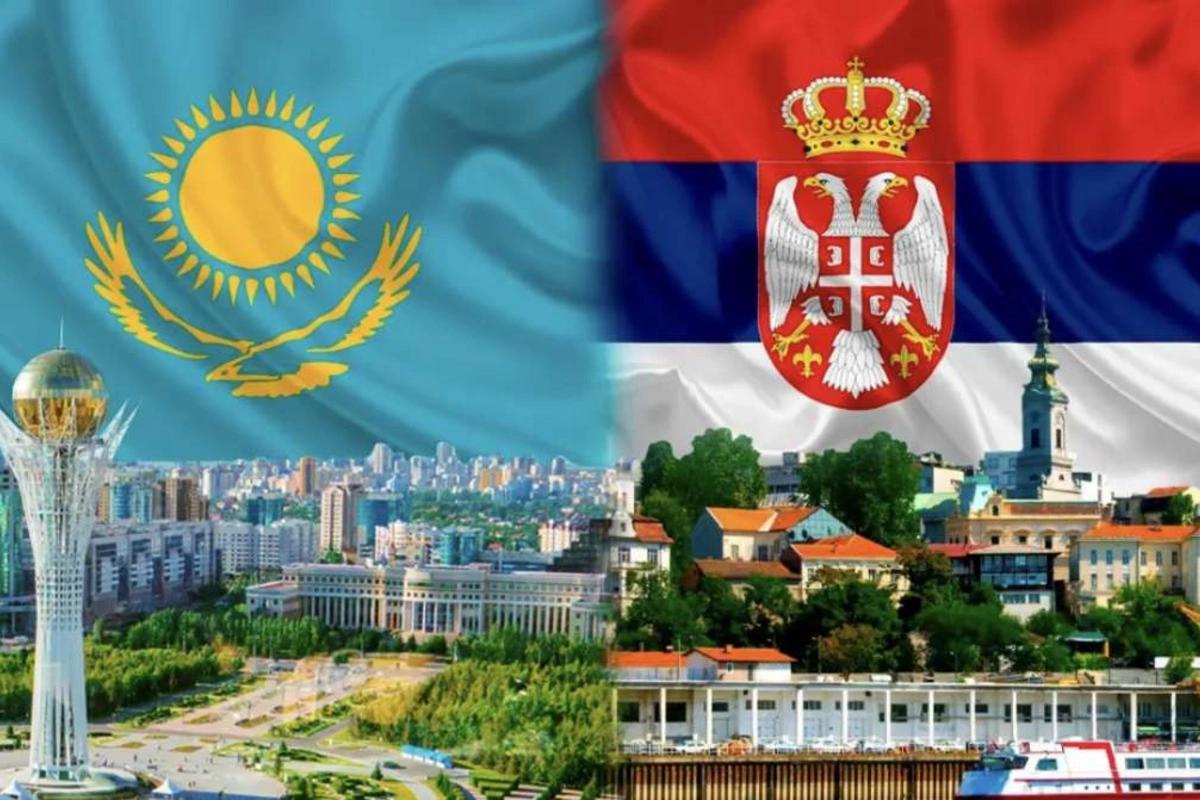
Diplomatic relations between the two nations were established on Dec. 10, 1996. Over the years, these ties have flourished with milestones such as the opening of Serbia’s embassy in Astana in 2011 and Kazakhstan’s embassy in Belgrade in 2019.
Photo credit: Kazinform
Kazakhstan and Serbia are celebrating 28 years of diplomatic relations, marked by consistent growth in political, economic, and cultural ties. The visit of Kazakh President Kassym-Jomart Tokayev to Belgrade on November 19 underscores the importance of this partnership, which is built on mutual respect and strategic cooperation, The Caspian Post reports citing foreign media.
Diplomatic relations between the two nations were established on Dec. 10, 1996. Over the years, these ties have flourished with milestones such as the opening of Serbia’s embassy in Astana in 2011 and Kazakhstan’s embassy in Belgrade in 2019.
Serbian presidents have visited Kazakhstan four times, including during the Astana Expo 2017. Regular high-level exchanges, including phone discussions between Tokayev and Serbian President Aleksandar Vučić, reflect a shared commitment to addressing global challenges and deepening bilateral cooperation.
Alisher Abdreshev, a leading expert at the Kazakhstan Institute for Strategic Studies (KazISS), noted the importance of interparliamentary ties and mutual support in international arenas.
“The strong partnership between Kazakhstan and Serbia is evident in Serbia’s support for Kazakhstan’s OSCE chairmanship bid, its hosting of EXPO 2017 in Astana and its candidacy as a non-permanent member of the UN Security Council for 2017-2018,” said Abdreshev.
“The trade turnover between our countries is slightly more than $90 million. Of course, this does not reflect the existing potential. Serbia remains a reliable partner for Kazakhstan in Southern Europe and the Balkans,” added Abdreshev.
He highlighted the significance of the 24 bilateral agreements underpinning cooperation, including efforts to enhance trade and transport connectivity through the Trans-Caspian International Transport Route (TITR), also known as the Middle Corridor.
Trade expansion
The trade turnover between Kazakhstan and Serbia until September reached $69.4 million, reflecting a 9.7% decline compared to $76.9 million during the same period in 2023, according to the Kazakh Ministry of Trade and Integration.
Despite the decrease, exports from Kazakhstan to Serbia grew by 15.4%, reaching $10.5 million. This growth was due to the increased shipments of mineral fertilizers, up by $6.4 million, and propylene polymers, which rose by $2.4 million. Other notable contributors included textile bags and packaging, lumber, dried legumes, lighting equipment and measuring instruments such as hydrometers and thermometers.
Contrarily, imports from Serbia to Kazakhstan dropped by 13.1% to $58.9 million. The decline was attributed to reduced imports of critical goods, including paper, cardboard, cellulose fiber and cotton wool, which dropped by 44.5% or $11 million. Asbestos cement products saw a sharp decrease of 98.9% or $10.4 million, while aluminum plates, sheets and strips declined by 69.8% or $5.2 million. Other reductions included instruments for measuring liquids and gases, liquid pumps, plastic pipes, hoses and tires.
Investment cooperation
Investment cooperation between Kazakhstan and Serbia has also seen gradual growth. According to the National Bank of Kazakhstan, since 2008, foreign direct investment (FDI) from Serbia to Kazakhstan has reached $17.4 million, while capital outflows – $17.3 million. Active companies with Serbian participation in Kazakhstan operate in construction, automotive trade and technical services.
Kazakh Invest facilitated discussions with Serbian companies such as Hipol, GOŠA FOM, and Sigma Ltd, exploring joint projects in electrical engineering, automation and industrial production. The recent Kazakh-Serbian business forum on Nov.12 in Belgrade provided a platform for business-to-business (B2B) meetings to discuss potential areas for collaboration in medicine, pharmaceuticals and other industries.
Open skies and transport cooperation
In September, Kazakhstan and Serbia discussed partnership prospects during the third meeting of the Kazakh-Serbian Intergovernmental Commission on trade and economic cooperation in Belgrade. The discussion highlighted the potential of an open-skies policy between the two nations, which currently allows 14 passenger flights per week.
“The open skies regime is in effect at airports in Kazakhstan. The opening of direct flights between our countries would allow Serbia to become a transport hub to Europe. We are also interested in developing transit for cargo transportation from Kazakhstan and China to Serbia, and further to European countries. We propose to consider the possibilities of the Trans-Caspian International Transport Route for this purpose,” said Serik Zhumangarin, a Deputy Prime Minister of Kazakhstan.
According to Zhumangarin, Kazakhstan is ready to supply Serbia with over $500 million worth of non-primary goods, including metallurgical, petrochemical, food, chemical, and machine-building products. Kazakhstan’s robust production and logistics infrastructure would also support the delivery of vehicles and construction materials.
Regarding agricultural trade, Kazakhstan aims to expand its exports of legumes, onions, buckwheat, cereals, and wheat to Serbia and add fish products, honey, poultry, horse meat, beef, and dairy products. In return, Kazakhstan seeks to import breeding cows and genetic material from Serbia to bolster its livestock industry.
Cultural and academic collaboration
Cultural exchange remains a cornerstone of the partnership. Serbia hosts annual performances by Kazakh cultural institutions, including the Astana Opera and regional drama theaters. The Kazakh Embassy in Serbia organizes events such as Cinema Days, Kazakh Cuisine Days and photography exhibitions.
Academic and agricultural collaboration has also grown. For over 30 years, Kazakhstan’s Budan LLP and Serbia’s Research Institute Zemun Polje have worked together to produce hybrid corn seeds, which now account for 85% of Kazakhstan’s crop. Serbian researchers have also contributed to the development of sunflower cultivation in Kazakhstan.
In June, the exhibition dubbed Women of the Great Steppe in Serbia showcased the contributions of Kazakh women to art, politics and science. Visitors explored Kazakh literature, cuisine and history, further strengthening the cultural ties between the two nations.
Share on social media